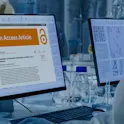IBMS to transition leading biomedical journal to Gold Open Access
Image: Tom Robertson/Shutterstock.com The Institute of Biomedical Science (IBMS) has announced the transition of the British Journal of Biomedical Science (BJBS) from hybrid access to gold open access in partnership with Frontiers. BJBS is the biomedical profession’s leading scientific journal; featuring peer-reviewed papers and reports on the latest scientific advances and laboratory techniques. The journal will transfer from the publisher Taylor & Francis to Frontiers from January 1, 2022, in coordination with the journal’s 20th anniversary of publication. For more than 100 years the IBMS has been dedicated to the promotion, development, and delivery of excellence in biomedical science within all aspects of healthcare, and to providing the highest standards of service to patients and the public. With over 21,000 members in 74 countries, the IBMS is the leading professional body for scientists, support staff, and students in the field of biomedical science. The IBMS will continue to support the community and benefit all biomedical scientists across the globe by transitioning the BJBS to gold open access with Frontiers. From 2022, all articles will be immediately, permanently, and freely available to read, download, and access for people everywhere. Authors will retain copyright on all new articles published and the journal […]














